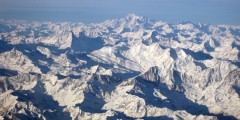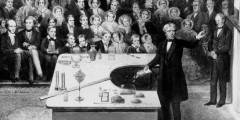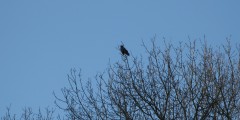Are they really climate deniers? Closing down debate in science and politics.
March 9, 2013
Just had an interesting back and forth with Vanessa Heggie about ‘what to call climate deniers/sceptics’? At the bottom of her excellent post on ‘how to debate with sceptics’, Vanessa wonders whether ‘denier‘ or ‘sceptic‘ is the right word to use around climate change. This was a handy reminder that, although I read stuff on …
What is science communication? Reflecting on one fall-out from the Cox/Ince debate
January 7, 2013
Just before Christmas 2012 Brian Cox and Robin Ince published an editorial in the New Statesman entitled ‘Politicians must not elevate mere opinion over science’, which provoked a lively debate on twitter, in blogs and in the Guardian about the relation between science and politics, the function of the history and philosophy of science, the …
Royal Institution Christmas Lectures: Some family memories
December 24, 2012
It will soon be time for our family to sit down and watch the Royal Institution Christmas Lectures. This is a ritual that is almost as important as Christmas itself. When I came to Oxford in 1985 from Germany, having studied French and philosophy. I had never heard of the Christmas lectures and ‘science’ was …
The end of journals? Open access, impact and the production of knowledge
December 6, 2012
Under direction from the government, there is a drive to make publicly funded research open access; that is, if you go to the website where the journal article resides, non-subscribers will not be met by a page asking you to part with $30+ for the privilege of reading. Research articles will be free to read….but …
Short circuiting the language of Sandy – how to balance literalism and lucidity?
November 14, 2012
My previous post here at MSP reflected on comments in the BBC’s Climategate Revisited programme, suggesting that uncertainties in climate science have come to the fore in the years following the publication of scientists’ emails. By being more open about such uncertainties, there may be a hope that some of the public trust lost after …
Echoes of Climategate: focusing on uncertainty?
November 13, 2012
The ever-lively climate blogosphere was given an extra jolt recently by a new BBC Radio 4 documentary – Climategate Revisited. The programme assessed the fallout from the infamous publication of emails from the University of East Anglia (UEA) server, rather than attempting to adjudicate on scientific claims or the contents of the emails. The programme …
The impact of earthquakes on making science public
October 25, 2012
Many articles have been written about the case of three seismologists, two engineers, a volcanologist and a public official who have been sentenced to be jailed for six years on 22 October in L’Aquila, Italy (although this sentence may be reduced on appeal). These members of the National Commission for the Forecast and Prevention of …
‘Silent spring’ – making science public
September 27, 2012
In terms of making science (and products of science) public, the book Silent Spring (1962) by Rachel Carson, published 50 years ago today, occupies a unique place. It was one of the first popular science books that shaped public perception of the world we live in and it also had direct political consequences. Carson’s book …
‘See through science’
August 25, 2012
I was recently reminiscing about Venice, where I have been many times, soaking up the sunshine, the colours and little miracles in glass (about which more later). So I started to think about science and glass, and the title of a famous 2005 booklet produced by James Wilsdon and Rebecca Willis popped into my head: …










